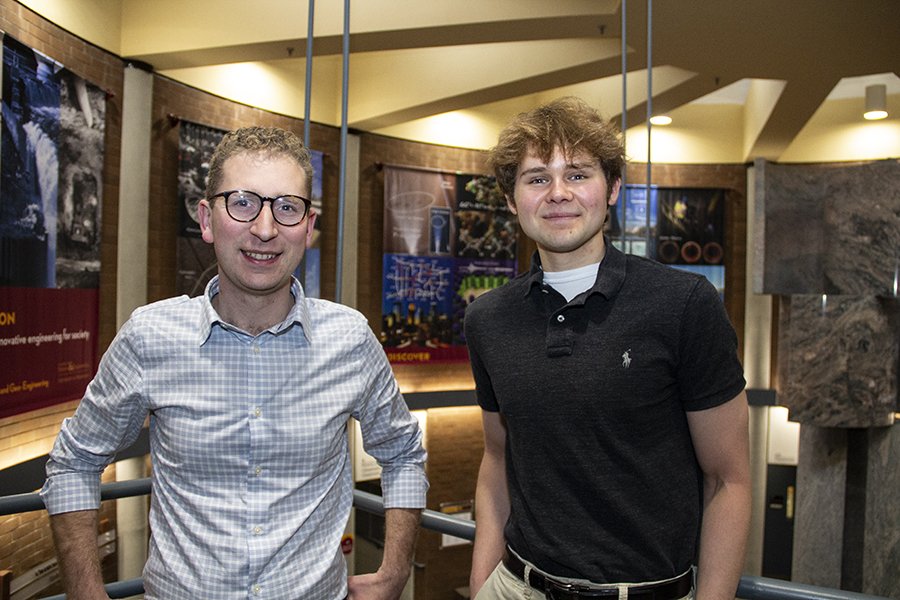The next generation of transportation engineers: Ben Rosenblad

Starting at the University of Minnesota College of Science and Engineering, Benjamin Rosenblad (BCE 2023) was not even aware that transportation was a specialty within Civil Engineering. Four years later, he found himself heading off to graduate school to study Next Generation Transportation Systems with the benefit of a competitive and highly prestigious fellowship from the National Science Foundation Graduate Research Fellowship Program (NSF GRFP).
“I first thought I wanted to do structural engineering. Then as I started taking transportation engineering courses and doing research, my interests changed. I found transportation engineering to be really exciting, especially some of the new technologies in the field like connected and automated vehicles.”
Rosenblad credits this shift in thinking to his CEGE major advisor Raphael Stern. Stern is an assistant professor of transportation engineering and has been with CEGE since 2019. Stern was drawn to to CEGE because of our longstanding reputation for driving innovation in transportation. Stern’s own research lies at the intersection of transportation and technology.
The two transportation enthusiasts became acquainted during Rosenblad’s sophomore year.
Rosenblad Discovers Transportation Engineering
“In my Computer Applications class," recalls Rosenblad, "many projects we did were associated with research done by a professor in the department. One project was developing a simple automated vehicle controller in MatLab, which was related to Prof. Stern’s research. That was how I found out about transportation research. I wrote to him and mentioned how much I liked the project and that I was interested in his work."
As a sophomore, Rosenblad took Prof. Stern’s Transportation Engineering course and was introduced to automated vehicles as an aspect of civil engineering. Rosenblad recalls, "It was an area that I was not familiar with. I felt like I would have to get involved in research if I wanted to work in that area, so I asked Prof. Stern if he had any open research positions." He did; he also had an interesting research project that Rosenblad could get involved in.The project involved developing a new car-following model to better represent the dynamics of adaptive cruise control (ACC) vehicles. That project lasted through spring semester and into the summer.
“So, I started doing research while taking Prof. Stern’s transportation engineering class. I did not have a lot of the skills going in," says Rosenblad, "but Prof. Stern was very patient and helpful about getting me up to speed. During that project, I realized that I really liked doing research and working on problems without pre-defined answers. That first project got me interested in this whole area —transportation, automated vehicles, and doing research. The research has been so enjoyable having a great mentor like Prof. Stern.”
During his undergraduate studies, Rosenblad was supported through three CEGE Research Internship Opportunity Scholarships, which are funded by CEGE donors and alumni. In his senior year, he received the James and Sharon Weinel Chi Epsilon Scholarship, which is awarded to senior CEGE undergraduate members of Chi Epsilon, a civil engineering honor society which recognizes students with high academic ability.
Stern continued to nurture Rosenblad’s nascent interests throughout his undergraduate studies. It was Prof. Stern who encouraged Rosenblad to pursue graduate school, alerted him to the NSF GRFP, and guided him through the rigorous application process. In 2022, NSF received over 12,000 applications in over 100 subfields, and only about 2,000 fellowships were awarded (https://www.nsfgrfp.org/applicants/ ).
Further Research
Rosenblad also worked on a project related to cybersecurity for ACC vehicles. With Stern’s research team, he developed some models for how automated vehicles might behave if there were a cyberattack on a vehicle. Using the data generated, they then estimated impacts on fuel consumption within the entire traffic stream. Rosenblad’s most recent involvement was an ongoing research project studying how automated vehicles might impact ramp metering strategies in Minnesota.
“The thing I enjoyed most throughout my undergraduate experience was doing research and working on these transportation problems. I thought working on problems like these would be a rewarding career.”
Rosenblad’s research also impacted his other classes, “My Capstone Design project addressed more traditional transportation problems, not having to do with vehicle automation, but still important problems. In my Capstone project, we used a micro simulation software called Synchro to simulate traffic. It was cool because I understood what was going on behind the software. All the vehicles simulated in Synchro use a car-following model. In my research, I had actually developed a car-following model. It was cool to have an understanding of how the software works and why vehicles behaved the way they did in simulation.”
“I want to let students know there are cool, new, exciting technologies in civil engineering! I also want to get other people interested in this area, as Prof. Stern and other faculty have done for me at UMN.”
Rosenblad will attend the University of Michigan in the fall of 2023 to study Next Generation Transportation Systems with Professor Yafeng Yin. Rosenblad’s NSF Graduate Research Fellowship provides him with three years of financial support.
“It is an amazing and unexpected opportunity! I am so lucky that Prof. Stern let me begin doing research with him in my sophomore year. I am very grateful.”